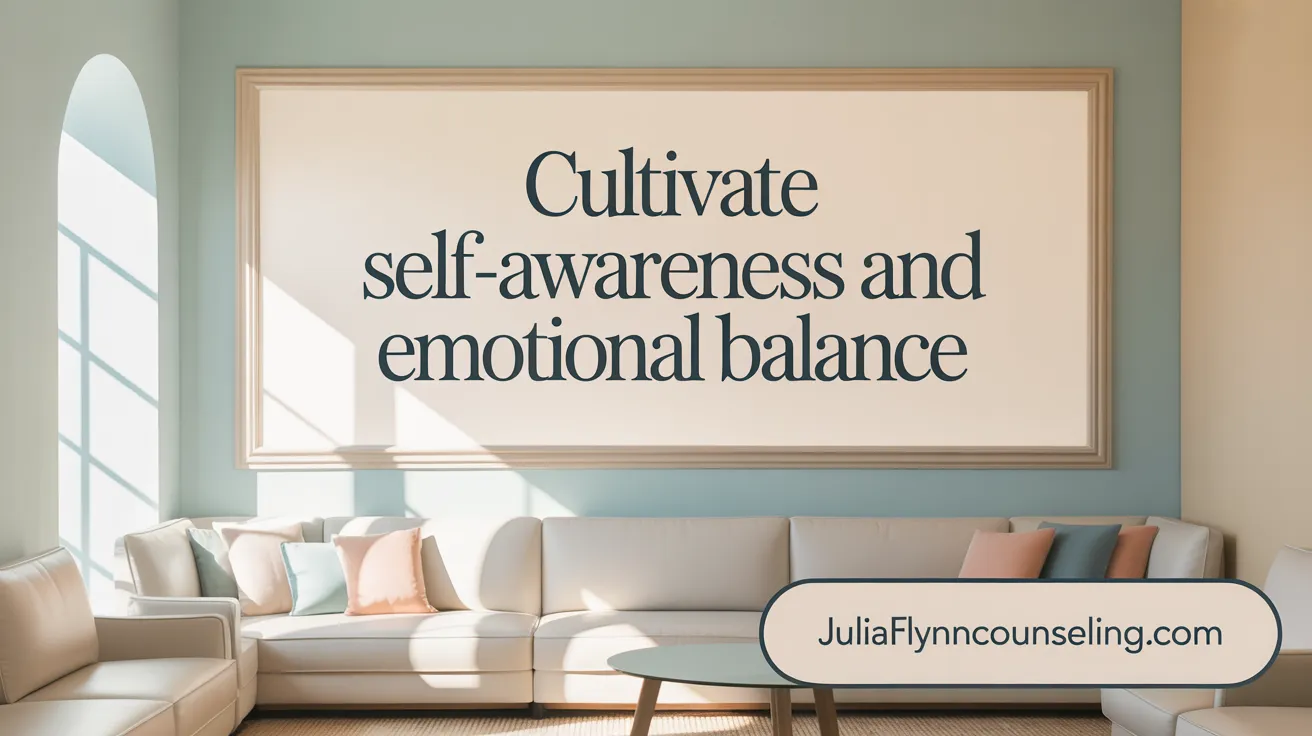Therapy as a Gateway to Personal Growth and Insight
Therapy: A Tool for Personal Growth
Therapy offers a supportive and confidential space where individuals can explore their thoughts, feelings, and behaviors. Far beyond addressing mental health challenges, it serves as a powerful tool for personal growth, allowing individuals to increase self-awareness, clarify values, and develop coping skills necessary for emotional well-being.
Enhancing Emotional Well-being and Self-awareness
One of the critical contributions of therapy lies in fostering emotional regulation and resilience. Through various evidence-based approaches such as Cognitive Behavioral Therapy (CBT) and mindfulness-based practices, therapy helps individuals identify negative thought patterns and emotional triggers. This process leads to healthier responses to stress and improved relationship skills.
Facilitating Insight and Personal Development
Therapy encourages deeper self-reflection, often uncovering unconscious life patterns and beliefs that shape behavior. Techniques from insight-oriented and psychodynamic therapies assist clients in connecting past experiences to present challenges. This insight enables meaningful personal change, promoting self-compassion, goal achievement, and a richer sense of identity.
By nurturing self-awareness, emotional intelligence, and resilience, therapy serves as a gateway to unlocking personal potential, supporting a lifelong journey of growth and fulfillment.
Diverse Therapeutic Approaches and Their Unique Contributions

Overview of various evidence-based therapeutic modalities
Therapy encompasses diverse approaches tailored to individual needs, including Cognitive Behavioral Therapy (CBT), psychodynamic therapy, Humanistic Therapies, and Mindfulness-Based Therapies. These methods offer distinct techniques to support personal growth, emotional regulation, and improved relationships.
How Cognitive Behavioral Therapy (CBT) fosters personal growth and emotional regulation
CBT targets the connection between thoughts, feelings, and behaviors. By identifying and challenging negative thought patterns, it enhances emotional regulation, problem-solving skills, and self-awareness. This goal-oriented, short-term therapy supports practical coping strategies and promotes positive behavioral changes. Learn more about Harnessing the Transformative Power of CBT.
Role of psychodynamic and insight-oriented therapies in uncovering unconscious patterns
Psychodynamic and insight-oriented therapies focus on exploring unconscious internal conflicts rooted in past experiences. Through techniques like free association, dream interpretation, and psychoeducation, these therapies help clients understand how early life influences impact current emotions and behaviors, fostering deeper self-awareness and healthier coping mechanisms. Explore more about Insight-Oriented Therapy and Psychodynamic Therapy.
Humanistic and mindfulness-based therapies supporting self-awareness and resilience
Humanistic therapies emphasize personal growth and self-actualization by creating a supportive, non-judgmental environment. Mindfulness-Based Therapies, including Acceptance and Commitment Therapy (ACT) and Dialectical Behavior Therapy (DBT), cultivate present-moment awareness and emotional resilience through acceptance, values clarification, and coping skills.
Emerging specialized therapies like EMDR and their application
Eye Movement Desensitization and Reprocessing (EMDR) is an evidence-based treatment designed to alleviate trauma-related distress by facilitating brain processing of traumatic memories. It involves phases such as desensitization and body scanning, effectively treating PTSD, phobias, and anxiety, contributing to trauma recovery within personal development.
Building a Strong Therapeutic Relationship to Maximize Growth

Importance of trust and open communication in therapy
A solid foundation of trust between therapist and client is essential for effective therapy. It creates a safe, non-judgmental space where individuals feel comfortable sharing vulnerable thoughts and feelings. Open communication fosters honesty, allowing clients to explore deep emotions and challenges more fully, which enhances self-awareness and healing and is supported by Active listening.
Role of goal setting and active engagement in therapy success
Setting clear, personalized goals helps direct therapy sessions toward meaningful outcomes. Clients benefit when they actively participate in the therapeutic process, applying insights and skills learned during sessions to daily life. Accountability through collaboration with the therapist keeps motivation high and encourages consistent progress as highlighted in therapy goal setting and communication and Assertive communication.
Therapist-client collaboration as a foundation for insight and self-change
Therapy is a collaborative journey where therapists and clients work jointly to uncover patterns, develop new perspectives, and build healthier coping strategies. This partnership supports deeper insight into behaviors and emotions, paving the way for self-directed change and personal growth, as supported by the power of insight-building in therapy and insight-oriented therapy.
How therapeutic rapport supports lasting behavioral and emotional change
A strong therapeutic rapport nurtures feelings of safety and acceptance, which are critical for experimenting with new behaviors and emotional regulation techniques. This rapport helps sustain resilience and promotes lasting changes beyond therapy by empowering clients to maintain healthier patterns independently, as emphasized in maximizing therapy outcomes and building resilience through therapy.
Enhancing Self-Awareness and Emotional Regulation through Therapy

Techniques to Develop Self-Awareness Including Mindfulness and Journaling
Therapy employs various techniques to foster self-awareness, a crucial step in personal growth. Mindfulness practices such as meditation, mindful breathing, and body scans encourage individuals to observe their thoughts and feelings in the present moment without judgment. This helps clients become more attuned to their internal experiences. Journaling complements this by providing a private space to reflect on emotions and identify recurring behavioral patterns, enabling clearer insight into one’s mental and emotional landscape.
Therapeutic Strategies for Emotional Regulation and Coping Skills
Emotional regulation is a vital skill developed in therapy. Techniques such as deep breathing exercises, progressive muscle relaxation, and grounding strategies enable clients to manage intense feelings like anxiety, anger, or sadness. Therapists also teach coping skills tailored to individual needs, helping clients respond to stress and setbacks with resilience. These strategies empower individuals to regain control over their emotional reactions and reduce distress. Resources on emotional regulation skills and coping strategies provide in-depth guidance.
Insight Building to Recognize and Reframe Negative Thought Patterns
Therapy facilitates insight into unconscious or automatic thoughts that may contribute to distress. Approaches like Cognitive Behavioral Therapy (CBT) help identify and challenge distorted thinking patterns, allowing clients to reframe negative beliefs into more balanced, realistic perspectives. This process supports healthier emotional responses and fosters positive behavioral changes. For further information, see resources on insight building in psychotherapy and therapeutic approaches.
Impact of Increased Self-Awareness on Decision Making and Resilience
With heightened self-awareness, individuals gain deeper understanding of their motivations, emotional triggers, and behaviors. This awareness enhances decision-making by enabling more intentional choices aligned with personal values. Additionally, better emotional regulation skills build resilience, allowing individuals to adapt and recover more effectively from adversity. Overall, therapy's focus on self-awareness, emotional control, and building resilience lays a foundation for sustained personal growth and well-being.
Therapy’s Role in Improving Relationships and Communication

How therapy improves interpersonal skills such as empathy and assertive communication
Therapy provides a supportive space where clients learn to recognize and express their emotions more clearly. Techniques like role-playing and guided discussions help develop assertive communication, allowing individuals to express their needs effectively while respecting others. Therapists also encourage the development of empathy by fostering perspective-taking and emotional understanding, crucial for healthy interpersonal interactions.
The impact of therapy on setting healthy boundaries and resolving conflicts
One significant benefit of therapy is helping individuals identify and establish personal boundaries, which promotes respect and mutual understanding in relationships. Conflict resolution skills are cultivated by teaching clients active listening, problem-solving, and emotional regulation strategies, which reduce misunderstandings and improve communication during disagreements.
Contribution of therapy to fostering deeper emotional connections
Through self-awareness gained in therapy, clients better understand their relational patterns and emotional needs. This insight allows for more authentic connections, as individuals can communicate their feelings openly and respond empathetically to others, building trust and intimacy.
Benefits of group and family therapies in community and relational growth
Group therapy creates a safe environment to share experiences, enhancing social skills and emotional intelligence through feedback and collective reflection. Family therapy improves communication dynamics within the family system, resolves conflicts, and strengthens bonds. Both formats promote a sense of belonging and deepen relational connections, supporting sustained personal and communal growth.
The Lifelong Journey: Sustaining Personal Growth Beyond Therapy

Continuing Self-Reflection and Self-Care Practices After Therapy
Sustaining personal growth after therapy requires ongoing self-reflection and committed self-care. Journaling, meditation, and mindfulness exercises prolong the benefits gained in therapy by encouraging regular awareness of thoughts and emotions. Engaging with supportive communities for growth and practicing relaxation techniques help maintain emotional balance.
Developing Resilience and Emotional Intelligence as Ongoing Goals
Resilience — the ability to adapt well to adversity — and emotional intelligence are crucial lifelong objectives. Therapy fosters these by teaching emotional regulation, stress management, and perspective shifting. Continuing to nurture these skills aids in coping with future challenges more effectively and fosters healthier relationships. For more about developing resilience and emotional intelligence, see resources on building emotional resilience.
Using Therapy Insights to Align with Personal Values and Life Purpose
Insights from therapy often lead to greater clarity about one’s values and life purpose. Individuals can use this understanding to make intentional decisions that resonate with their authentic selves. Reflective practices help ensure that daily choices and long-term goals remain aligned with personal meaning and growth.
Strategies for Integrating Therapeutic Tools Into Daily Life for Lasting Growth
To embed therapy gains into everyday life, individuals can:
- Set realistic goals and break them into small, manageable steps.
- Practice coping strategies like mindful breathing during stress.
- Apply assertive communication and boundary-setting skills in relationships.
- Maintain self-compassion by acknowledging progress with kindness.
By sustaining these efforts, therapy becomes the foundation for continuous growth, empowering individuals to lead resilient, purposeful, and fulfilling lives. For guidance on maximizing therapy outcomes and practical therapeutic approaches, explore further resources.
Therapy as a Catalyst for Empowerment and Fulfillment
Multifaceted Benefits in Personal Development
Therapy serves as a powerful catalyst for personal growth, offering more than just relief from mental health challenges. It fosters increased self-awareness, improved emotional regulation, and healthier relationship skills. Through various approaches—such as Cognitive Behavioral Therapy, psychodynamic therapy, and mindfulness-based strategies—therapy equips individuals with essential coping techniques, resilience, and tools to clarify and pursue meaningful personal goals.
Embracing Therapy for Deeper Growth
Engaging in therapy encourages honest self-exploration in a safe, supportive space, allowing individuals to uncover underlying patterns, beliefs, and emotional responses. This process promotes a compassionate understanding of oneself, challenges limiting thoughts, and nurtures self-confidence. Therapy also supports ongoing self-reflection, helping clients align actions with their values and cultivate a growth mindset.
Enduring Impact on Mental Health and Life Satisfaction
Beyond sessions, therapy’s benefits resonate throughout life by enhancing emotional well-being, resilience, and interpersonal connections. It empowers individuals to navigate life transitions effectively and sustain positive changes that increase overall life satisfaction. Embracing therapy is a proactive step towards leading a more fulfilled, authentic, and empowered life.
